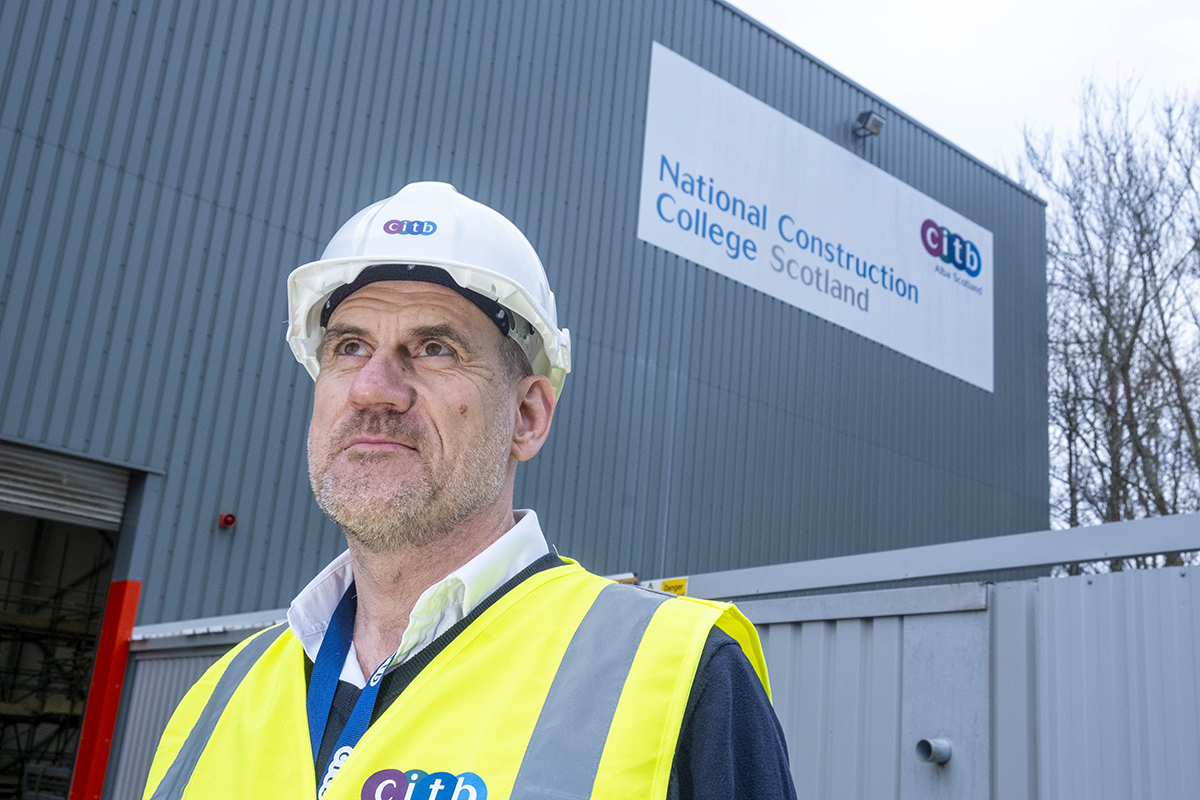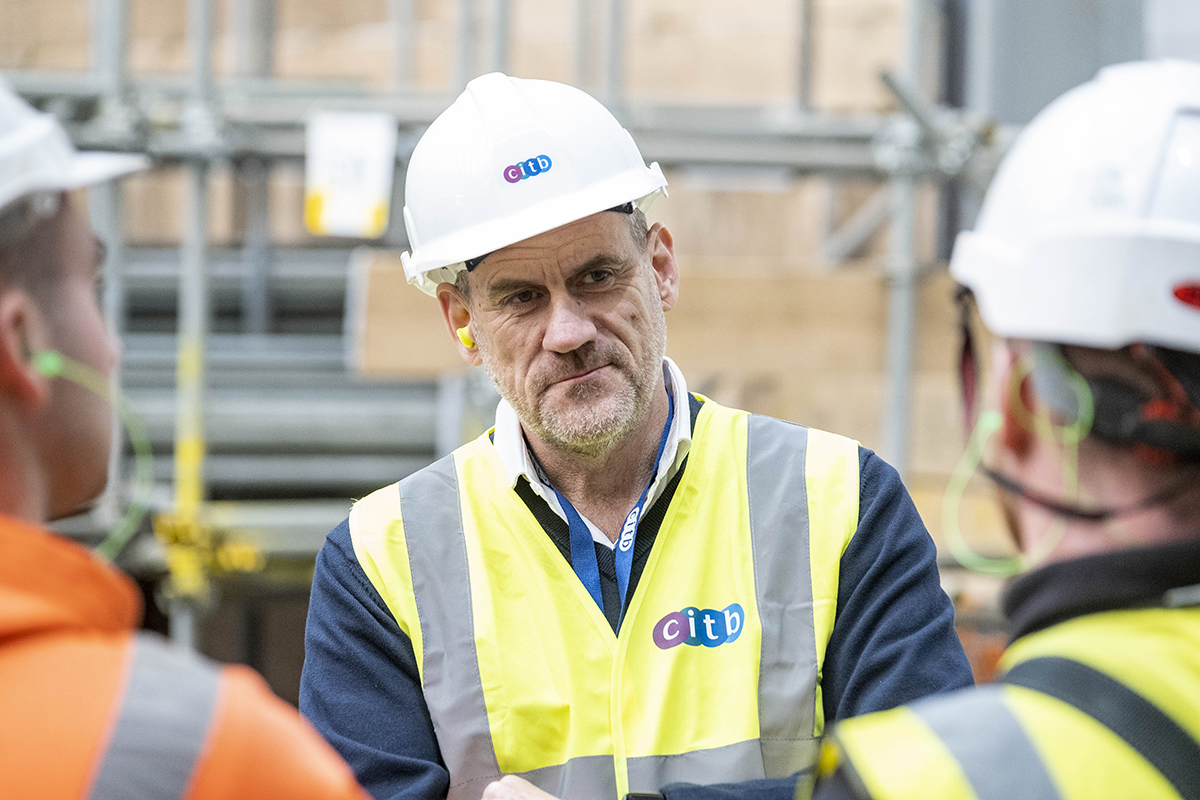
SCOTLAND is leading the way when it comes to construction apprenticeships, with numbers now exceeding pre-pandemic levels.
In an exclusive interview with Project Scotland, Construction Industry Training Board (CITB) chief executive Tim Balcon revealed that if what’s currently happening in Scotland was replicated throughout the rest of Britain, the number of apprentices would QUADRUPLE nationally.
Figures released by Skills Development Scotland indicate that the number of construction and related Modern Apprentices in training for the end of Quarter 3 2021/22 was 12,814 – 254 more than in 2019/20.
Balcon attributes the Scottish success to three things: the ‘exceptional’ response of SME businesses and their supply chains when it comes to taking on apprentices; support from the Scottish Government and Skills Development Scotland including the introduction of the £5,000 Apprenticeship Employer Grant; and the work being done by the CITB apprenticeship engagement team to provide the necessary support.
Balcon spoke to Project Scotland during a visit north of the border to mark Scottish Apprenticeship Week. He described apprenticeships as the ‘bedrock’ when it comes to finding solutions to tackle industry skills shortages and ensure a thriving future pipeline of talent.
“It’s not the answer to everything, but it’s the bedrock by which all the answers fall into,” he explained. “Research shows that people who come through the apprenticeship route tend to be the ones that stay in the industry. They’re also the ones that are the future managers and leaders, and the ones most likely to be future business owners.
“That route is absolutely essential in keeping the industry stable in terms of skills.”
Balcon, who started his own career as an apprentice, is keen to see a wide range of methods used to help people gain entry into the sector. He cited the number of refugees who have construction skills which could be utilised, while former Armed Forces personnel as well as ex-offenders looking to turn their lives around also have plenty to offer.
The interview took place on International Women’s Day. Balcon described the desire to diversify the construction industry as a ‘no-brainer’.
“I’ve stopped talking about the need to be more inclusive because I think people understand that,” he added. “What we need to look at is how we do it. One of the recruitment methodologies that the construction industry has is word of mouth. We’ll talk to a mate or family member, and that’s all well and good but we need to be a little more sophisticated in our approach if we are to properly understand inclusivity. We need to broaden our horizons a little bit… to accommodate individuals into the industry.”
Balcon became chief executive of the CITB six months ago, having previously led a number of professional and membership bodies across various sectors.
He’s been impressed by what he’s seen in the construction sector – and stressed that the industry’s often-cited image problem is not unique, nor insurmountable.
“People tell me that is the case (that construction has an image problem),” he stated. “I’m quite open minded on this because I’ve worked in various sectors in my life and every sector I’ve worked in seems to have an image problem. So, I don’t know whether construction has a bigger problem than anywhere else, or whether actually we just don’t make visible the opportunities in construction at that school age. It’s more about awareness.
“The (CITB) Fairness, Inclusion and Respect programme is setting out the construction industry values. We need to work hard on that to make sure people look at construction as an opportunity for everybody.
“There’s work to be done in schools without any shadow of a doubt.”

One of Balcon’s primary aims at the CITB is to empower employers and put them in charge of the skills agenda. He’s seeking to engage bosses at all levels – including micro businesses – so that they are more involved in describing what their skills and training needs are.
He believes the industry is on the cusp of a ‘transformation’ thanks to factors including net zero ambitions and digitisation.
“The innovation required to lead those objectives is yet to be determined,” Balcon said. “How do we build net zero homes? We’ve actually got some answers to this; every day we see new technology coming out. The construction industry is going to be a catalyst for how the economy transitions to net zero. The designers, the architects, the planners all have a role to play and need to learn new skills. It’s on the edge of transformation and one of the things I’d like CITB to do is play a stronger leadership role and be a catalyst for that transitional period.”
Balcon paid tribute to the sector for the role it has played in helping the economy through the pandemic period.
Despite the ‘very tough operating conditions’, he believes the industry more than held its own and actually outperformed a number of other sectors.
“Nobody knew what would happen. We were anticipating there would be a huge amount of redundancies, etc, etc, but it’s been the opposite. There’s been high demand for construction.
“We often refer to construction as being the big projects, but what you’ve got is a whole army of micro businesses that underpin all of this. Without those micro businesses the big projects wouldn’t get done. We have to recognise that running a small business through a pandemic must have been incredibly stressful. I just think the bravery of those people who kept it going should be recognised.”
With more than 26,000 new workers required in Scotland by 2025, Balcon was planning to use his trip north to speak to people on the ground to find out their specific needs and discuss further ways CITB can support employers moving forward, citing as an example the fact that being a scaffolder in Glasgow is different to being a scaffolder in the Highlands and Islands.
The trip was also scheduled to take in a visit to the Edinburgh Futures Institute. The refurbishment and extension project being undertaken by Balfour Beatty utilises Building Information Modelling (BIM) and augmented and virtual reality technologies to enhance the restoration process of the building. The site has supported the training of more than 40 apprentices over the course of its life cycle.
To date, there are 4,500 apprentices in Scotland with Levy-registered employers, who benefit from just over £90 million in direct and indirect grants from CITB and SDS.
Frank Mitchell, Skills Development Scotland chair and Scottish Apprenticeship Advisory Board co-chair, said, “When it comes to supporting sustainable skills through workforce development or providing opportunities for young people, we know that apprenticeships work.
“The combination of commitment from employers and the backing of Scottish Government will ensure apprenticeships work for everyone, making a significant contributor to Scotland’s recovery and productivity growth.”








